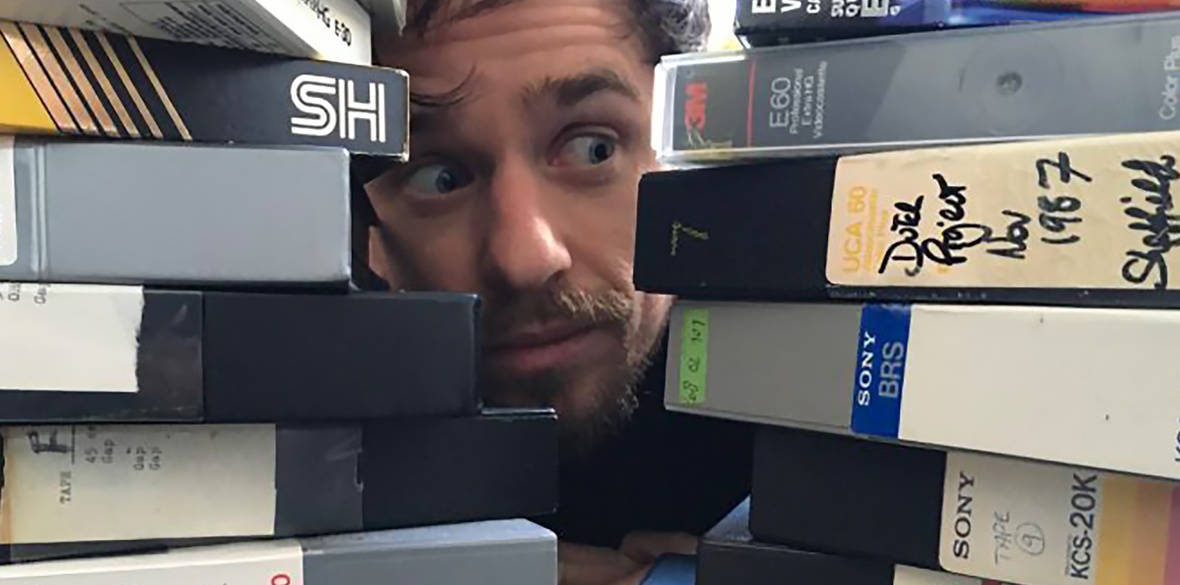This is the last article you can read this month
You can read more article this month
You can read more articles this month
Sorry your limit is up for this month
Reset on:
Please help support the Morning Star by subscribing here
ALEX GLEN WILSON is, first and foremost, a collector. Having been an avid DJ and vinyl fanatic for a number of years, he sees “crate digging” for unique sounds as both an art form and a meaningful pastime.
But his collection extends beyond that of music. As a working audio-visual archivist, his principal aim lies within amassing a collection of documentaries, film clips and newsreels.
“I was born and raised in Hull, have lived in Leeds and Liverpool, and spent a decade working in London, where my sense of place and interest in the region’s stories really intensified,” he explains.
As it does for so many displaced northerners, absence made his heart grow fonder. It was while working as researcher on a music video history project that Wilson first stumbled across the activity centred around Sheffield City Polytechnic, Psalter Lane Art School and artists, bands, and film-makers that blossomed across Sheffield around the late ’70s and 1980s.
He would soon begin to explore this period of history in greater detail and “researching that period and place more closely led me down an amazing wormhole,” he says.
“I was well aware of the post-punk music scene in Yorkshire at this time but any moving-image makers were much less documented.
“From those foundations I built up an academic project based first around Sheffield film and video and then in the wider region and it has kind of snowballed in all sorts of cool directions since then.”
By bringing together these fragments of the past, Wilson has effectively uncovered a radical vision of 20th-century Yorkshire that, while it remains relatively obscure to the London-centric world of art and media, is very much alive and kicking in the local area.
“Yorkshire has a proud tradition of moving-image production, dating back to the early cinema age, with Le Prince and the Sheffield Photo Company,” Wilson explains.
“However, it wasn’t until the 1970s and 1980s when things really changed up and with more affordable camera technologies, new funding potential and a sense of autonomy [that there was] the very real possibility of making films without having to move to London.
“Radical film collectives were springing up all over the country during these two decades, united by new technology, a new left politics, a growing appetite for independence and opposition to the film and TV mainstream — and of course the Thatcher government.”
According to Wilson, it was during this time that the cities of Sheffield, Leeds, York and Bradford saw a diverse range of activity, from political and conscious animation groups like the Leeds Animation Workshop to all-women radical groups such as York Independent Film and the Sheffield Film Co-op.
There were also political groups responding to hot topics and changes in industry, like Leeds’s Video Vera, Sheffield’s Steel Bank and Banner Films.
“Of course, as with any historical project, this narrative of Yorkshire as a radical film hub becomes somewhat fragmented when looking beyond these larger collectives,” he says.
There were some who just made one film and disappeared, films that remain lost as just catalogue notes or single films and he cites Khoon Aur Paisa (Blood and Money), made in Huddersfield.
“It has the righteous claim to being the first Bollywood, Hindustani-language film made in the UK —but a master print remains lost.”
It is difficult to deny that the late 20th century saw creatives all over the country embracing an independent or grassroots approach to film and media. As such, were these Yorkshire-based film-makers really unique?
Wilson argues that, in many ways, they were. “I’d like to make a case for proper myopic Yorkshire exceptionalism — ‘nowt was really happening elsewhere’ — but I’m no Geoffrey Boycott, thank goodness!” he laughs.
“There’s evidence of a uniquely Yorkshire specificity, or rather multiple Yorkshires, on display in these films. Work I’ve found responds to local political currents, works with local people and artists, or explicitly addresses landscape, urban or rural — it’s those films that really stand out.”
While current restrictions prevent lovers of film from discovering new works, this archivist continues to showcase these stand-out mini-masterpieces by way of his Vimeo channel, currently free for all to access. He assures me, however, that he hopes to pay the film-makers their dues in the near future.
“In an ideal scenario, it would be great to somehow reimburse the original film-makers either through streaming rights, or through possible licensing of their footage into new documentaries.
“For now, it has given a wider audience to this undervalued culture, and on the back of it I’ve had a number of enquiries and projects, and hosted screenings — so, to that end, it’s great.”
Alex Glen Wilson’s work can be seen on his website, alexglenwilson.com or his Vimeo channel, vimeo.com/alexglenwilson.











